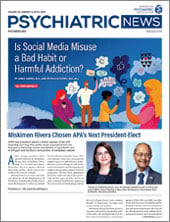General medical advice to pregnant people is to avoid drinking alcohol, smoking, and using substances such as cannabis because of the potential harm to both mother and child. Now a
study in the
American Journal of Preventive Medicine bolsters that advice by showing an increased risk of attention-deficit/hyperactivity disorder (ADHD) in children whose mothers used these substances while pregnant.
“With cannabis legalization increasing, we are seeing more women of childbearing age using cannabis along with other common substances such as alcohol and tobacco,” lead author Jennie E. Ryan, Ph.D., told Psychiatric News. She is an assistant professor at Thomas Jefferson University in Philadelphia. “Furthermore, recommendations for alcohol use support abstinence, but this is based on little scientific evidence, leaving many pregnant people wondering how much harm can result from small to moderate substance use? We therefore wanted to provide information to inform [health professionals] as well as pregnant people.”
Ryan and colleagues examined data from 11,874 children in the
Adolescent Brain Cognitive Development (ABCD) Study, a longitudinal study designed to assess brain and cognitive development from childhood through adolescence. The researchers measured parent-reported ADHD symptoms as defined by the annual Child Behavioral Checklist scale. At baseline, they also asked the children’s biological mothers whether they used substances once they knew they were pregnant.
Overall, 5.27% of the children had parent-reported ADHD. Compared with children of mothers who did not use any substances during pregnancy, children whose mothers used both alcohol and tobacco while pregnant had 4.27 times the odds of having parent-reported ADHD. Those whose mothers used tobacco and cannabis while pregnant had 2.18 times the risk and those whose mothers used cannabis but no other substances while pregnant had 2.09 times the risk of having parent-reported ADHD.
“While the primary aim of our study was to examine patterns of polysubstance, that is, combinations of substances that may affect ADHD outcomes, the finding of cannabis-only use stood out to me,” Ryan said. “This is concerning given the growing number of pregnant people using cannabis during their pregnancy. The endocannabinoid system plays an important role in fetal development, and we have not fully elucidated the effects of exogenous cannabis consumption on the developing endocannabinoid system of the fetus. Like much of the research on the endocannabinoid system, we still have a lot to learn.”
Ryan stressed the importance of talking with pregnant people and women of childbearing age about the risks of using substances.
“Many Americans use medicinal cannabis for several ailments, and [cannabis] use for certain diseases is well documented in the literature,” Ryan explained. “If a patient is using cannabis medicinally, psychiatrists and other [health professionals] should have a discussion with that patient about the risk versus benefit of continuing use throughout the pregnancy.”
Ryan noted that the study had some limitations, notably the low prevalence of reported maternal substance use in the sample and the retroactive reporting of prenatal substance use.
“Despite these limitations, the study’s findings provide important information for patients and [health professionals] and will help inform conversations between [health professionals] and their pregnant patients.”
This study was supported by Thomas Jefferson University and the National Institute on Drug Abuse. ■

